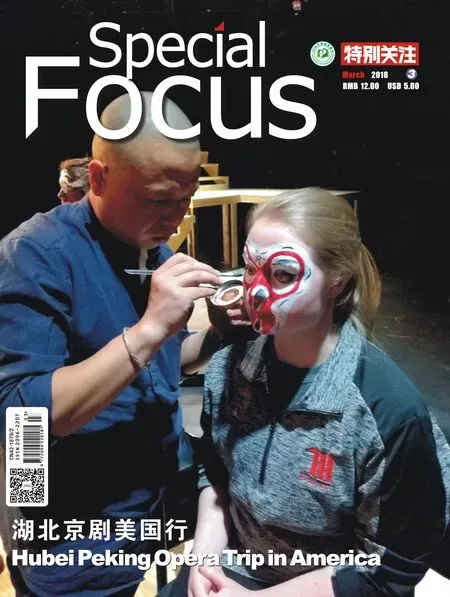Flexibility Meets Abstraction
By James Henry [US]

James Henry is a native of San Jose,California, English teacher and writer.“Learning about other cultures has brought me joy. Life in China has been my favorite.”
Flexibility refers to the ability to grow, shift,change, stretch. I love this special feature of the English language: its ability to embrace and describe new realities, to upcycle old words and create new ones. Poems written in English can inspire various shades of emotion depending on the words the writer chooses to string together.
The Chinese language is uniquely beautiful in another way. From the written characters,concept encapsulating pictographs rich in meaning and inferred emotion, to the use of ChengYu, four character idioms that tell a story or express an idea in its simplest form. It’s a powerful creative tool. Chinese poets explain and define a place or thing in clean detail,selecting characters that evoke a moving concept cloaked in deeper meaning. At times the seemingly ambiguous nature of the connection between these characters allows the reader to muse abstractly and enjoy filling the poem with their own heart’s song.
Tang Dynasty poetry (唐詩 Táng shī) refers to poetry composed during China’s Tang Dynasty (618-907). Evolving into its own characteristic style,Tang Shi reached its “Golden Age” during the reign of Empress Wu Zetian (690-705). One of the most famous books of Tang Dynasty Poems, the Quan Tang Shi (Complete Tang Prose) holds more than 48,900 poems by over 2,200 poets. During this prolific period, written poetry was part of everyday life influencing all levels of society. Scholars mastered the art to pass civil service entrance exams but the average person had access to it as well, resulting in a large body of work. Only a partial record remains of this vastly expansive artistic movement.While many poets are unknown,some have taken their place in history as celebrated master composers like Li Bai and Du Fu,influencing the modern world of literature.
Wang Ji (王绩) lived in Shan Xi during the Tang Dynasty 590-644. Besides drinking with his friends and playing the zither, he was a writer, scholar, and poet. Of his five most famous poems this is my favorite.
过酒家
此日长昏饮
非关养性灵
眼看人尽醉
何人独为醒
Passing Through the Ale House
This long day I’m drinking
I'm drunk but keep it up
They are drunk and happy
but really they are crooks
Why do I wake alone?
Why translate the poem this way? The reason Wang Ji felt moved to write this poem,according to one source,was the unjust behavior of government officials. They would extort money from the poor leaving them destitute.Corruption and injustice beyond his control left Wang Ji overwhelmed and sad. The poet was careful not to state this concern overtly as this could create problems for him with the officials. But the sentiment is clear and the feeling of helplessness resides within the piece. A desire for justice and moral uprightness are themes that permeate many of the Tang poems.
斗转星移,从古老的唐诗到现代的emoji表情,人类的表达方式已然发生诸多变化,然而,不论语言与表达方式如何变换,真理亘古不变,我们的爱恨喜悲也一如往昔。多重文化多种语言交织汇集成当今的多元世界,相信我们能以更加灵活和富有创意的方式来表达唐诗的抽象美,共享这一全人类的精神财富。
There are many reasons to laugh and many reasons to cry which add up to a lot of reasons for drinking. Yes “wine is for those bitter of soul,” a universal truth through the ages. Poetry is an equally potent remedy for what ails the soul and Tang Dynasty poets were fond of bringing these two remedies together. As in the poem above, wine and alcohol figure prominently in many poems from the Tang Era.
Something intrinsically beautiful about the Chinese language that causes Tang poems to stand out is the one syllable structure of Chinese characters. These can be arranged into a repeated rhythm. This rhythm creates movement or meter that the words dance to. This motion that tides along is part of the content and can’t be ignored by a good translation. If a translator were to disregard this element viewing it as decorative and unimportant, some of the meaning would also be lost. Wang Ji chose his words carefully within a rhythm that communicates the formalism of his day. In the above English translation, each line is six syllables long in an attempt to keep a rhythmic harmony.English language relies heavily upon accentual meter and can’t accurately mimic the rhythm that sings to us from the immortal hearts of ancient Chinese poets.
Rhyming is one aspect of language that highlights its flexibility. Words and sentence structures can be adjusted to create rhyming patterns and songs. You can choose words with similar meanings and different syllable counts to modify the rhythm and conform to musical accompaniment. This makes the idea feel completed. The ancient Chinese poets wield rhyming structure artistically within their poems.The last character in the first line rhyming with the second and fourth line, establishing symmetrical beauty that feels whole.
This is an adaptation of the same Tang poem by Wang Ji with rhyme.
Regardless how you focus the translation, human truth that echoes through the poets of the ancient Tang Dynasty into the clutter of our modern emoji ridden hearts is evidence that at our core we haven’t changed.From the ancient past down till now, our love and hate, joy and sorrow remain the same. As our world culture grows into its multilingual reality, I believe we will find more flexible and creative ways to possess the abstract beauty we all share. ◆
——宋·王安石《咏竹》

